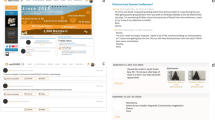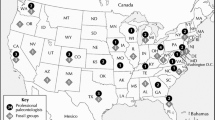Abstract
The Community of Practice framework has been used theoretically and empirically to describe the diverse ways people learn from one another through social interaction in a variety of specific contexts. To date, most research of this genre has favored investigating the community and domain constructs of the theory over the authentic practice construct. Those interested in recognizing and supporting science learning in non-school contexts across a lifespan are then limited in efforts to delineate how communities engage in domain-specific practice. This is especially relevant in the study of online environments which afford more democratic forms of participation. With the goal of adding to both theoretical and practical knowledge, this study explored practices that members enacted on a community-based website specific to the domain of paleontology. We used a multiple case study approach to provide comparative and contrasting narratives concerning the development of practice within an online, scientific community. Methods consisted of downloading data from the website, including members’ self-described attributes within member profiles, followed by their contributions to three of the website’s features: the forums, activity feed, and messages. An analytical framework which typified members based on their self-described attributes was applied, then members’ contributions were coded using an empirically based Communities of Practice framework. For one of the first times, we identified practice within an online, scientific community through comparing the contributions of three community members, finding that practice consisted of providing social support to other community members and having domain-based conversations.

Similar content being viewed by others
References
Alexander, P. A. (2003). The development of expertise: The journey from acclimation to proficiency. Educational Researcher, 32(8), 10–14. https://doi.org/10.3102/0013189X032008010.
Bondy, E., Beck, B., Curcio, R., & Schroeder, S. (2017). Dispositions for critical social justice teaching and learning. Journal of Critical Thought and Praxis, 6(3), 1–16.
Bex II, R. T., Lundgren, L., & Crippen, K. J. (2019). Scientific Twitter: The flow of paleontological communication across a social network. PLoS One, 14(7), e0219688. https://doi.org/10.1371/journal.pone.0219688.
Brossard, D., & Scheufele, D. A. (2013). Science, new media, and the public. Science, 339(6115), 40–41.
Bucchi, M. (2008). Of deficits, deviations and dialogues: Theories of public communication of science. In M. Bucchi & B. Trench (Eds.), Handbook of public communication of science and technology (pp. 57–76). London, England: Routledge.
Corin, E. N., Jones, M. G., Andre, T., Childers, G. M., & Stevens, V. (2017). Science hobbyists: Active users of the science-learning ecosystem. International Journal of Science Education, Part B, 7(2), 161–180. https://doi.org/10.1080/21548455.2015.1118664.
Creswell, J. (2009). Research design: Qualitative, quantitative, and mixed method approaches. Thousand Oaks, CA: SAGE Publications, Inc..
Crippen, K. J., Ellis, S., Dunckel, B. A., Hendy, A. J. W., & MacFadden, B. J. (2016). Seeking shared practice: A juxtaposition of the attributes and activities of organized fossil groups with those of professional paleontology. Journal of Science Education and Technology, 25(5), 731–746. https://doi.org/10.1007/s10956-016-9627-3.
Cunningham, J. A., Rahman, I. A., Lautenschlager, S., Rayfield, E. J., & Donoghue, P. C. J. (2014). A virtual world of paleontology. Trends in Ecology & Evolution, 29(6), 347–357. https://doi.org/10.1016/j.tree.2014.04.004.
Daume, S., & Galaz, V. (2016). ‘Anyone know what species this is?’ - Twitter conversations as embryonic citizen science communities. PLoS One, 11(3), e0151387. https://doi.org/10.1371/journal.pone.0151387.
Dowthwaite, L., & Sprinks, J. (2019). Citizen science and the professional-amateur divide: Lessons from differing online practices. Journal of Communication Management, 18(1). https://doi.org/10.22323/2.18010206.
Forbes, A., & Skamp, K. (2013). Knowing and learning about science in primary school ‘Communities of science Practice’: The views of participating scientists in the MyScience initiative. Research in Science Education, 43(3), 1005–1028. https://doi.org/10.1007/s11165-012-9295-0.
Forbes, A., & Skamp, K. (2014). ‘Because we weren’t actually teaching them, we thought they weren’t learning’: Primary teacher perspectives from the MyScience initiative. Research in Science Education, 44(1), 1–25. https://doi.org/10.1007/s11165-013-9367-9.
Forbes, A., & Skamp, K. (2016). Secondary science teachers’ and students’ involvement in a primary school community of science practice: How it changed their practices and interest in science. Research in Science Education, 46(1), 91–112. https://doi.org/10.1007/s11165-014-9457-3.
González-Howard, M., & McNeill, K. L. (2016). Learning in a community of practice: Factors impacting English-learning students’ engagement in scientific argumentation. Journal of Research in Science Teaching, 53(4), 527–553. https://doi.org/10.1002/tea.21310.
Gray, B. (2004). Informal learning in an online community of practice. Journal of Distance Education, 19(1), 20–35.
Jones, M. G., Andre, T., Childers, G., & Corin, E. (2014). Where are the women and minority amateur paleontologists? A study of the development of characteristics of science hobbyists. Presented at the 10th north American paleontological convention.
Kimble, C., Hildreth, P. M., & Bourdon, I. (Eds.). (2008a). Communities of practice: Creating learning environments for educators, volume 1. Charlotte, NC: Information Age Publishing.
Kimble, C., Hildreth, P. M., & Bourdon, I. (Eds.). (2008b). Communities of practice: Creating learning environments for educators, volume 2. Charlotte, NC: Information Age Publishers, Inc..
Kisiel, J. F. (2009). Exploring a school-aquarium collaboration: An intersection of communities of practice. Science Education, 94(1), 95–121. https://doi.org/10.1002/sce.20350.
Krzywoszynska, A. (2019). Making knowledge and meaning in communities of practice: What role may science play? The case of sustainable soil management in England. Soil Use and Management, 35, 160–168. https://doi.org/10.1111/sum.12487.
Land-Zandstra, A. M., Devilee, J. L. A., Snik, F., Buurmeijer, F., & van den Broek, J. M. (2016). Citizen science on a smartphone: Participants’ motivations and learning. Public Understanding of Science, 25(1), 45–60. https://doi.org/10.1177/0963662515602406.
Lautenschlager, S., & Rücklin, M. (2014). Beyond the print-virtual paleontology in science publishing, outreach, and education. Journal of Paleontology, 88(4), 727–734. https://doi.org/10.1666/13-085.
Lave, J., & Wenger, E. (1991). Situated learning. Cambridge, UK: Cambridge University Press.
Liberatore, A., Bowkett, E., MacLeod, C. J., Spurr, E., & Longnecker, N. (2018). Social media as a platform for a citizen science community of practice. Citizen Science: Theory and Practice, 3(1). https://doi.org/10.5334/cstp.108.
Lundgren, L., Crippen, K. J., & Bex, R. T., II. (2018). Digging into the PIT: A new tool for characterizing the social paleontological community. In The Proceedings of E-Learn: World Conference on E-Learning in Corporate, Government, Healthcare, and Higher Education 2018 (pp. 121–128). Chesapeake, VA: Association for the Advancement of Computing in Education (AACE).
Merriam, S. B. (2009). Qualitative research. San Francisco, CA: Jossey-Bass.
Moran, S., McLaughlin, C., MacFadden, B., Jacobbe, E., & Poole, M. (2015). Fossil explorers: Third-grade students’ examine ancient organisms in modern times. Science and Children, 53(4), 62–67.
Pan, Y., Xu, Y., Wang, X., Zhang, C., Ling, H., & Lin, J. (2015). Integrating social networking support for dyadic knowledge exchange: A study in a virtual community of practice. Information & Management, 52(1), 61–70. https://doi.org/10.1016/j.im.2014.10.001.
Raddick, M. J., Bracey, G., Gay, P. L., Lintott, C. J., Murray, P., Schawinski, K., . . . Vandenberg, J. (2010). Galaxy Zoo: Exploring the motivations of citizen science volunteers. Astronomy Education Review, 9(1). https://doi.org/10.3847/AER2009036.
Raddick, M. J., Bracey, G., Gay, P. L., Lintott, C. L., Cardamone, C., Murray, P., . . . Vandenberg, J. (2013). Galaxy Zoo: Motivations of citizen scientists. Astronomy Education, 12(1). https://doi.org/10.3847/AER2011021
Ryder, R. J., Burton, J. L., & Silberg, A. (2006). Longitudinal study of direct instruction effects from first through third grades. The Journal of Educational Research, 99(3), 179–192. https://doi.org/10.3200/JOER.99.3.179-192.
Sadler, T. D. (2009). Situated learning in science education: Socio-scientific issues as contexts for practice. Studies in Science Education, 45(1), 1–42. https://doi.org/10.1080/03057260802681839.
Sharma, P., & Land, S. (2018). Patterns of knowledge sharing in an online affinity space for diabetes. Educational Technology Research and Development, 67(2), 1–29. https://doi.org/10.1007/s11423-018-9609-7.
Smith, S. U., Hayes, S., & Shea, P. (2017). A critical review of the use of Wenger’s Community of Practice (CoP) theoretical framework in online and blended learning research, 2000-2014. Online Learning, 21(1). 209–237. https://doi.org/10.24059/olj.v21i1.963.
Stake, R. E. (1995). The art of case study research. Thousand Oaks, CA: Sage Publications.
Sun, N., Rau, P. P.-L., & Ma, L. (2014). Understanding lurkers in online communities: A literature review. Computers in Human Behavior, 38, 110–117. https://doi.org/10.1016/j.chb.2014.05.022.
Vitone, T., Stofer, K., Steininger, M. S., Hulcr, J., Dunn, R., & Lucky, A. (2016). School of Ants goes to college: Integrating citizen science into the general education classroom increases engagement with science. Journal of Science Communication, 15(1), A03.
Wenger, E. (2000). Communities of practice and social learning systems. Organization, 7(2), 225–246. https://doi.org/10.1177/135050840072002.
Wenger, E., McDermott, R. A., & Snyder, W. (2002). Cultivating communities of practice. Boston, MA: Harvard Business School Press.
Wenger, E., & Synder, W. (2000). Communities of practice: The organizational frontier. Harvard Business Review, 78(1), 4–20.
Wenger, E., White, N., & Smith, J. D. (2009). Digital habitats: Stewarding technology for communities. Portland, OR: CPsquare.
Wenger-Trayner, E., Fenton-O’Creevy, M., Hutchinson, S., Kubiak, C., & Wenger-Trayner, B. (2015). Learning in landscapes of practice: Boundaries, identity, and knowledgeability in practice-based learning. London, England: Routledge.
Yacobucci, M. M., & Lockwood, R. (2012). Teaching paleontology in the 21st century. Ithaca, NY: Paleontological Research Institution.
Funding
This research was funded by the National Science Foundation under Grant No. DRL-1322725.
Author information
Authors and Affiliations
Corresponding author
Ethics declarations
Conflict of Interest
The authors declare that they have no conflict of interest.
Disclaimer
Any opinions, findings, and conclusions or recommendations expressed in this material are those of the authors and do not necessarily reflect the views of the National Science Foundation.
Rights and permissions
About this article
Cite this article
Lundgren, L., Crippen, K.J. & Bex, R.T. Profiles in Practice: Stories of Paleontology Within an Online, Scientific Community. Int J of Sci and Math Educ 19, 915–933 (2021). https://doi.org/10.1007/s10763-020-10095-5
Received:
Accepted:
Published:
Issue Date:
DOI: https://doi.org/10.1007/s10763-020-10095-5




